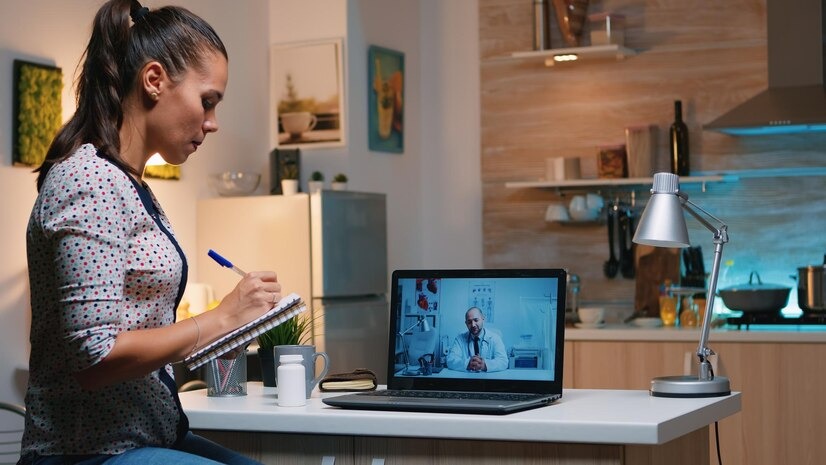The agreement will also allow the creation of jobs for doctors, in addition to internships for training and development on the platform. A survey conducted by EBRAMED shows that, for every 4 doctors, 3 do not know how to provide care via telemedicine and do not feel prepared for the practice.
November 2022 – Democratize medical care, revolutionize health and make it increasingly accessible and humanized to millions of people. This is the common thread that unites Brazilian School of Medicine (EBRAMED) – the first Postgraduate platform focused on digital teaching for doctors across the country -, and Docway, a digital health solutions company, better known as the “Uber” for scheduling medical appointments and other services.
With the partnership between the two, the expectation is that doctors from all over the country will be able to specialize in technology for care, in addition to receiving training in work management with the school's academic and clinical supervision, as well as the possibility of employment in the area. The Brazilian School of Medicine, an edtech created in 2020, expects to grow 62% in enrollments and increase revenue by approximately R$$ 3.9 million per month, in a universe that supports more than 100 thousand medical appointments per month.
The partnership also aims to solve some of the problems of the general population, such as reducing costs in unnecessary trips to the hospital – many cases could be resolved with an online consultation, for example. This has positive effects on waiting times for care, as well as helping to relieve pressure on the health system. According to the National Health Agency (ANS), stays in emergency rooms can exceed two hours, depending on the patient's risk classification, not to mention the high exposure to other transmissible pathologies in collective environments. Data also show that approximately 80% of patients who go to the ER could be treated via telemedicine.
Another important point is to establish the safety of doctors in remote care, since this is not a subject that is already applied and studied at Universities. Data from EBRAMED reveals that, of each 4 doctors, 3 do not know how to provide care to patients via telemedicine and/or do not feel prepared to do so. The study, which included more than 800 doctors from large Brazilian cities such as São Paulo, Minas Gerais, Rio de Janeiro, Distrito Federal and Santa Catarina, as well as Maranhão and Rio Grande do Sul, exposed a historical problem in the country: the lack of medical specialization in technology.
“We will reach doctors in cities far from major training centers. We are the only specialization in the world market that offers, digitally, teaching and a lot of practice simultaneously: work, education, income, mobility and time optimization, all in the same place. With the arrival of Docway, we will be the largest hub for practical internships in telemedicine in the country”, says Marcus Vinicius Tatagiba, CEO and founder of the Brazilian School of Medicine.
The partnership with Docway is strategic for scaling the business, as it provides all the equipment and technological expertise for remote care, as well as patient referrals and preceptorship, while EBRAMED will offer theoretical and practical knowledge for medical training and efficient teamwork management. The estimate is to reach 1,200 doctors and provide around 2,800 patient care services in various specialties in the first year. “If we consider the potential for care, the prospect of reaching this target is even greater, around 3.4 million consultations, with an economic impact of around R$175 million,” says Tatagiba.
Initially, the hospital medical internship program will begin this month for students of postgraduate courses in Internal Medicine, Emergency Medicine, Pediatrics and Family and Community Medicine, with a minimum duration of six months and a maximum of two years. Other specialties are included in the calendar and should be included later this year and next year, such as Cardiology, Psychiatry and Gynecology, in addition to specific training for the use of the platform, protocols and safety conduct in consultations and procedures, which guarantee total doctor-patient confidentiality, in accordance with the General Data Protection Law - LGPD.
Advances in telemedicine regulation in the country
Over the last 10 years, there has been a significant increase in the number of people seeking medical training. More than 500,000 doctors have graduated, of whom approximately 641 have the title of specialist. The outlook for 2030 is even higher: this number is expected to exceed 800,000. This is what the study carried out by the CFM – Federal Council of Medicine in partnership with the University of São Paulo indicates.
Specifically in the medical field, there are more professional opportunities than there are doctors available. Brazil has 2.4 professionals for every thousand inhabitants, higher than the population of Japan, for example, and close to countries such as the United States (2.6), Canada (2.7) and the United Kingdom (2.8). In many countries considered developed, this number is in the range of 4 per thousand inhabitants.
Thanks to the regulation of telemedicine, it has been possible to expand and democratize access to quality healthcare for more people, in addition to increasing the capacity to provide care throughout Brazil. According to the Federal Council of Medicine (CFM), telemedicine is “the practice of medicine mediated by technologies for the purposes of care, education, research, prevention of diseases and injuries, and health promotion.”
“The practice of telemedicine does not replace face-to-face medicine. It is a tool to contribute to the development, agility and cost reduction of the healthcare sector as a whole, whether through the exchange of experience and knowledge between professionals, by enabling more comprehensive and qualified care to a greater number of people who would not have access under normal conditions, or even through practicality, dynamism and comfort”, points out Docway CEO, Fábio Tiepolo.





